
Privacy statement: Your privacy is very important to Us. Our company promises not to disclose your personal information to any external company with out your explicit permission.

Wind-solar complementary street lights are solar energy and wind energy two energy generation technologies and system intelligent control technology, which are in line with renewable energy generating circuit lights. The required system may also be more than other new energy sources. The basic configuration is solar energy The board, wind turbine, controller, battery, light pole and lamp are composed of many configurations, but its working principle is not very complicated. This article first introduces the principle of wind-solar complementary solar street lights, secondly explains the accessories and advantages of wind-solar complementary solar street lights, and finally introduces the issues to be paid attention to when choosing wind-solar complementary street lights and the maintenance of light-solar complementary street lights.
The wind-solar hybrid power generation system is a device that converts wind energy and light energy into electrical energy. The working principle of the wind-solar complementary street lamp is to use natural wind as the power. The wind wheel absorbs the energy of the wind and drives the wind turbine to rotate to convert the wind energy into electrical energy. The rectification and voltage stabilization function converts the alternating current into direct current, charges the battery pack and stores electrical energy. The photovoltaic effect is used to directly convert solar energy into direct current for use by the load or stored in the battery for backup.
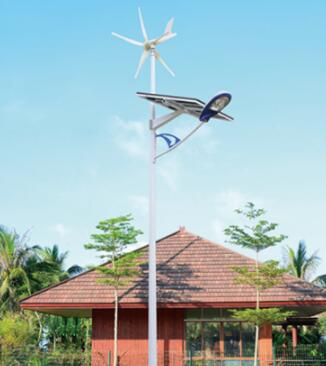
Solar cell components, fans, solar high-power LEDs, LPS lamps, photovoltaic control systems, fan control systems, solar-free maintenance-free batteries and other components, solar cell module brackets, fan accessories, lamp posts, embedded parts, battery buried boxes, etc. Accessories. Next introduces in detail:
A wind turbine is a facility that converts natural wind into electrical energy. The electrical energy is sent to the storage battery for storage. It cooperates with the solar panel to provide energy for the street lamp. Depending on the power of the light source, the power of the wind turbine used is also different, generally 200W, 300W, 400W, 600W, etc. There are several kinds of output voltage, such as 12V, 24V, 36V and so on.
The solar panel is the core part of the solar street lamp and the most valuable part of the solar street lamp. Its role is to convert the sun's radiation capacity into electrical energy, or send it to a storage battery for storage. Among the many solar cells, there are three types of monocrystalline silicon solar cells, polycrystalline silicon solar cells and amorphous silicon solar cells, which are more common and practical. In the east and west regions where the sunlight is sufficient, it is better to use polycrystalline silicon solar cells, because the production process of polycrystalline silicon solar cells is relatively simple and the price is lower than that of single crystals. In the southern region where there are many rainy days and the sunshine is not very sufficient, it is better to use monocrystalline silicon solar cells because the performance parameters of monocrystalline silicon solar cells are relatively stable. Amorphous silicon solar cells are better when there is insufficient outdoor sunlight, because amorphous silicon solar cells have lower requirements for sunlight conditions.
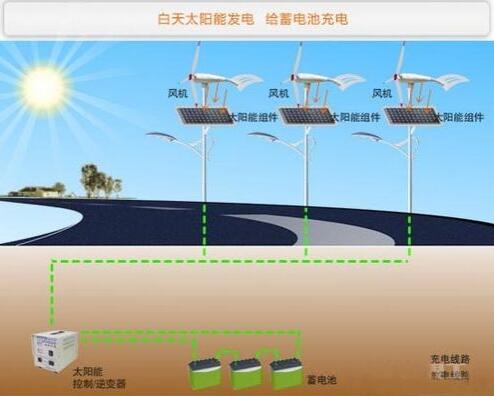
Regardless of the size of solar lamps, a good performance charge and discharge controller is essential. In order to prolong the service life of the battery, its charge and discharge conditions must be limited to prevent the battery from overcharging and deep charging. Where the temperature difference is large, a qualified controller should also have a temperature compensation function. At the same time, the solar controller should also have street lamp control functions, with light control and time control functions, and should have automatic load control at night to extend the working hours of street lights on rainy days.
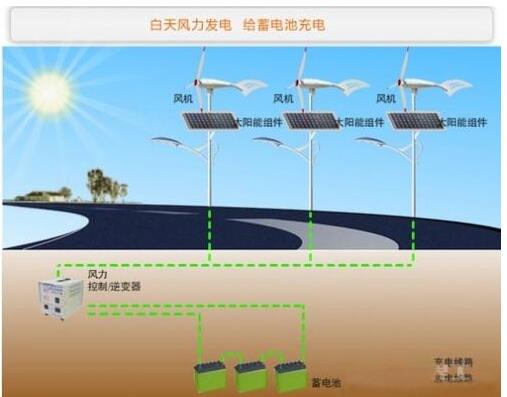
Since the input energy of the solar photovoltaic power generation system is extremely unstable, it is generally necessary to configure a battery system to work. Generally, there are lead-acid batteries, Ni-Cd batteries and Ni-H batteries. The selection of battery capacity generally follows the following principles: first of all, under the premise of satisfying night lighting, the energy of solar cell modules during the day should be stored as much as possible, and at the same time, it should be able to store the electrical energy that meets the needs of continuous rainy night lighting at night. The battery capacity is too small to meet the needs of night lighting. The battery is too large. On the one hand, the battery is always in a state of power loss, affecting the battery life and causing waste. The accumulator should be matched with the solar cell and power load (street light). A simple method can be used to determine the relationship between them. The solar cell power must be 4 times higher than the load power for the system to work properly. The voltage of the solar cell must exceed the working voltage of the battery by 20 to 30% in order to ensure that the battery is normally negatively charged. The battery capacity must be more than 6 times the daily consumption of the load. For the selection of storage batteries, we recommend the use of gel batteries, which have a long service life and are more environmentally friendly.
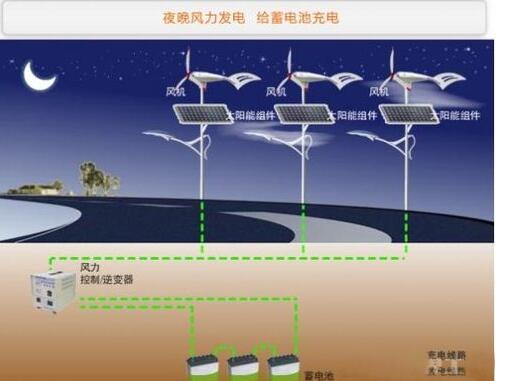
What kind of light source is used for solar street lamps is an important indicator of whether the solar lamps can be used normally. Generally, solar lamps use low-voltage energy-saving lamps, low-voltage sodium lamps, electrodeless lamps, and LED light sources.
(1) Low-voltage energy-saving lamp: low power, high light efficiency, but service life of 2000 hours, low voltage lamp black, generally suitable for solar lawn lamps, courtyard lamps.
(2) Low-pressure sodium lamps: Low-pressure sodium lamps have high efficiency (up to 200Lm / w) and are used less.
(3) Electrodeless lamp: low power and high light efficiency. The lamp is used under 22V (pure sine wave, frequency 50 Hz) under ordinary city power conditions, and the life span can reach 50,000 hours. The service life of solar lamps is greatly reduced and it is almost the same as ordinary energy-saving lamps (because solar lamps are square wave counters Transformer, solar power 220V output frequency, item position, voltage can not be compared with ordinary commercial power.
(4) LED: LED light source, long life, up to 1000000 hours, low operating voltage, no inverter required, high light efficiency, domestic 50Lm / w, imported 80Lm / w, with the progress of technology, LED performance Will be further improved. LED as a light source of solar street lights will be a trend.
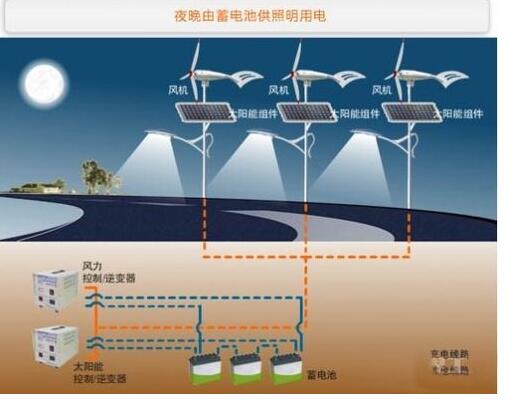
The height of the light pole should be determined according to the width of the road, the spacing of the lamps, and the illuminance standard of the road. The lamp housing has collected a lot of foreign solar lamp data according to my tungsten. Between the beautiful housing and energy saving, most of them choose to save energy. The appearance of the lamp is not high, and it is relatively practical.
Because ordinary street lamps must be powered by buried cables, on highways more than three kilometers away from the power point, the construction cost of street lamp power supply lines is very high. With the extension of kilometers, a booster system is also required. Therefore, in the roads in the outer suburbs, The cost of the street lamp power supply line is high, and the power consumed on the line is also large. Wind-solar complementary street lamps do not require transmission lines and consume no electrical energy, which has obvious economic benefits.
At present, there is a great need to educate the public about the environmental protection and new energy knowledge. Wind-solar complementary street lights can directly show the application of clean natural energy such as solar energy and wind energy to the followers.
Windmills are mascots that bring good luck in traditional Chinese culture. Beautifully-shaped windmills are lined up along the highway, flying against the wind, and will become the landscape of the road.
Resource-saving and environment-friendly society is becoming the general trend. Compared with traditional street lamps, wind-solar complementary street lamps use natural renewable solar and wind energy as energy, do not consume any non-renewable energy, and do not emit polluting gases into the atmosphere, resulting in zero pollution emissions. In the long run, the protection of the environment is self-evident, and at the same time it also eliminates the cost of a large amount of electricity bills in the later period.
The operation procedures of the mains lighting project are complicated, and basic engineering such as cable trench excavation, laying of hidden pipes, pipe threading, and backfilling requires a lot of labor. At the same time, large quantities of electrical equipment such as transformers, power distribution cabinets, and power distribution boards also require a lot of financial resources. Wind-solar complementary street lamps do not. Each street lamp is a separate individual, no need to lay cables, no large quantities of electrical equipment, saving manpower and financial resources.
Since conventional street lamps are connected by cables, it is likely to affect the entire power supply system due to individual problems. Wind-solar complementary circuit lights will not have this situation. In the distributed independent power generation system, individual damage will not affect the normal operation of other street lamps. Even if a large-scale power outage is encountered, it will not affect the lighting, and the uncontrollable losses will be greatly reduced.
Street lights are installed in remote areas where power grids are not available, and the cost of wiring installation is high, and there will be serious theft. Once theft, it affects the entire power output, and the loss is huge. There will be no worries when using wind-solar complementary street lamps. Each street lamp is independent, eliminating the need for cable connections. Even if theft occurs, it will not affect the normal operation of other street lamps and reduce losses to a low level.
Wind-solar complementary street lights are controlled by an intelligent controller, which can be divided into two automatic control modes: time control and light control, which are both safe and economical; their own independent integrated power supply system is not interfered by large-area circuit construction, the process is simple, and the construction period Short, more convenient maintenance.
As an emerging energy system, it has played a role in brightening while saving costs and improving system stability. Today, where traditional energy occupies most of the market, new energy will undoubtedly become a highlight of cities and communities.
The lack of traditional energy and pollution to the environment have reached the point where they must be resolved. Global air pollution is quite serious, and the use of new energy can effectively increase people's awareness of energy saving and make our lives more quality and energy-saving. Wind-solar complementary street lamps are intelligent street lamps that use wind energy and solar energy for power supply. They also have the advantages of both wind power and solar power, and provide a stable power supply for urban street lights.
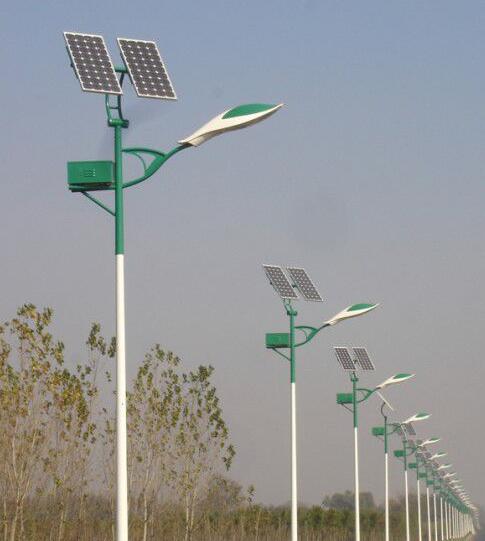
The fan is the iconic product of the wind-solar complementary street lamp. The most important thing for the choice of the fan is to make the fan operate smoothly. The light pole is a non-positioned pylon, the minimum heart is caused by the vibration of the fan when the fan is running and the fixing parts of the lampshade and the solar bracket are loose. Another major factor in choosing a fan is its beautiful appearance, light weight, and reduced tower load.
Ensuring the lighting time of street lamps is an important indicator of street lamps. As a separate power supply system, wind-solar complementary street lamps, from the selection of street lamp bulbs to fans,
The configuration of the capacity of the solar battery and the energy storage system has a problem of optimal configuration design, and the design of the optimal capacity configuration of the system needs to be combined with the natural resource conditions of the street lamp installation location
According to the selected fan and solar cell capacity and installation height requirements, combined with local natural resource conditions to design the strength of the light pole, determine the reasonable light pole and structural form.
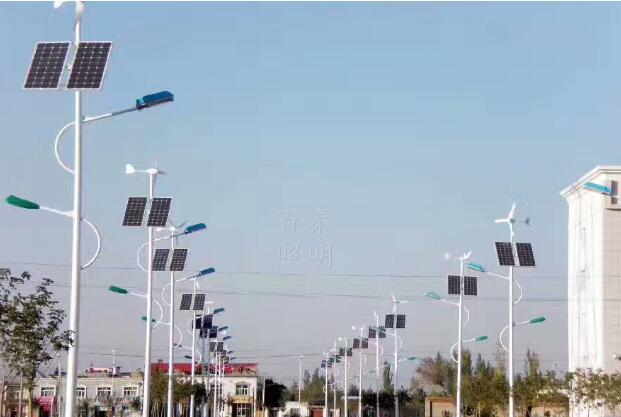
1. Check the wind turbine blades. Focus on checking whether the blades are deformed, corroded, and damaged or cracked. Blade deformation will result in uneven blade sweep area, and blade corrosion and defects may make the weight of several blades inconsistent, which will cause uneven rotation or jitter when the wind turbine rotates. If there is a crack in the blade, you need to confirm whether the crack is caused by material stress or other reasons, but no matter what the reason is, if the blade has a crack, it should be replaced.
2. Check the fasteners, fixing screws and wind turbine rotation of the wind-solar complementary solar street lamp, and check whether the connecting pieces or fixing screws of each connection are loose or rusty. If there is any problem, it should be tightened or updated immediately. Turn the wind turbine blade by hand to check whether it rotates and rotates freely. If the rotation is not effective or there is abnormal sound, it is a bad phenomenon.
3. Measure whether the electrical connection between the surface shell, pole and ground of the wind turbine is smooth. The electrical connection is unobstructed, and the safety of the wind turbine system can be effectively protected in the event of a lightning strike.
4. When the wind generator rotates in the breeze or the street lamp manufacturer manually rotates, measure whether the output voltage of the wind generator is normal. It is normal that the output voltage is about 1V higher than the voltage at both ends of the power storage; if the output voltage of the wind turbine is lower than the battery voltage during rapid rotation, it means that the output of the wind turbine is problematic.
First check whether there is dust or dirt on the surface of the solar cell module of the wind-solar complementary solar street light. If it exists, scrub with water, a soft cloth or a sponge; for dirt that is more difficult to remove, use a soft detergent that does not contain abrasives. Secondly, check the battery module surface or the ultra-clear glass for cracks and electrodes. If this phenomenon is found, a multimeter is required to detect the open circuit voltage and short circuit current of the battery module to see if they are consistent with the battery module specifications. At the same time, if the voltage value of the input to the controller can be measured on a sunny day, the location result is consistent with the output result of the wind turbine, which means that the output of the battery assembly is normal, otherwise it needs to be repaired for an abnormal phenomenon.
The above content is provided by WOSEN. WOSEN is a professional manufacturer and supplier of Led Flood Light, Led Street Light, Led Solar Light, etc. For more information, please visit https://www.wosenled.com/ or contact admin@wosenled.com or WhatsApp +86-13425434349
August 11, 2023
August 11, 2023
Wyślij je do tym dostawcy
August 11, 2023
August 11, 2023

Privacy statement: Your privacy is very important to Us. Our company promises not to disclose your personal information to any external company with out your explicit permission.

Fill in more information so that we can get in touch with you faster
Privacy statement: Your privacy is very important to Us. Our company promises not to disclose your personal information to any external company with out your explicit permission.